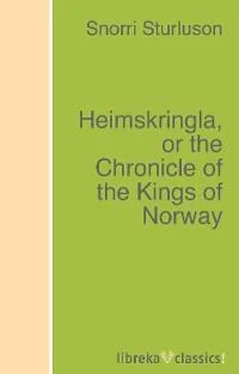Snorri Sturluson - Heimskringla, or the Chronicle of the Kings of Norway
Здесь есть возможность читать онлайн «Snorri Sturluson - Heimskringla, or the Chronicle of the Kings of Norway» — ознакомительный отрывок электронной книги совершенно бесплатно, а после прочтения отрывка купить полную версию. В некоторых случаях можно слушать аудио, скачать через торрент в формате fb2 и присутствует краткое содержание. Жанр: unrecognised, на английском языке. Описание произведения, (предисловие) а так же отзывы посетителей доступны на портале библиотеки ЛибКат.
- Название:Heimskringla, or the Chronicle of the Kings of Norway
- Автор:
- Жанр:
- Год:неизвестен
- ISBN:нет данных
- Рейтинг книги:3 / 5. Голосов: 1
-
Избранное:Добавить в избранное
- Отзывы:
-
Ваша оценка:
- 60
- 1
- 2
- 3
- 4
- 5
Heimskringla, or the Chronicle of the Kings of Norway: краткое содержание, описание и аннотация
Предлагаем к чтению аннотацию, описание, краткое содержание или предисловие (зависит от того, что написал сам автор книги «Heimskringla, or the Chronicle of the Kings of Norway»). Если вы не нашли необходимую информацию о книге — напишите в комментариях, мы постараемся отыскать её.
libreka classics – These are classics of literary history, reissued and made available to a wide audience.
Immerse yourself in well-known and popular titles!
Heimskringla, or the Chronicle of the Kings of Norway — читать онлайн ознакомительный отрывок
Ниже представлен текст книги, разбитый по страницам. Система сохранения места последней прочитанной страницы, позволяет с удобством читать онлайн бесплатно книгу «Heimskringla, or the Chronicle of the Kings of Norway», без необходимости каждый раз заново искать на чём Вы остановились. Поставьте закладку, и сможете в любой момент перейти на страницу, на которой закончили чтение.
Интервал:
Закладка:
4. EIRIK'S DEATH.
King Eirik had many people about him, for he kept many Northmen who had come with him from the East; and also many of his friends had joined him from Norway. But as he had little land, he went on a cruise every summer, and plundered in Scotland, the Hebrides, Ireland, and Bretland, by which he gathered property. King Athelstan died on a sick bed, after a reign of fourteen years, eight weeds, and three days. After him his brother Jatmund was king of England, and he was no friend to the Northmen. King Eirik, also, was in no great favour with him; and the word went about that King Jatmund would set another chief over Northumberland. Now when King Eirik heard this, he set off on a viking cruise to the westward; and from the Orkneys took with him the Earls Arnkel and Erlend, the sons of Earl Torfeinar. Then he sailed to the Hebrides, where there were many vikings and troop-kings, who joined their men to his. With all this force he steered to Ireland first, where he took with him all the men he could, and then to Bretland, and plundered; and sailed thereafter south to England, and marauded there as elsewhere. The people fled before him wherever he appeared. As King Eirik was a bold warrior, and had a great force, he trusted so much to his people that he penetrated far inland in the country, following and plundering the fugitives. King Jatmund had set a king, who was called Olaf, to defend the land; and he gathered an innumerable mass of people, with whom he marched against King Eirik. A dreadful battle ensued, in which many Englishmen fell; but for one who fell came three in his place out of the country behind, and when evening came on the loss of men turned on the side of the Northmen, and many people fell. Towards the end of the day, King Eirik and five kings with him fell. Three of them were Guthorm and his two sons, Ivar and Harek: there fell, also, Sigurd and Ragnvald; and with them Torfeinar's two sons, Arnkel and Erlend. Besides these, there was a great slaughter of Northmen; and those who escaped went to Northumberland, and brought the news to Gunhild and her sons (A.D. 941).
5. GUNHILD AND HER SONS.
When Gunhild and her sons knew for certain that King Eirik had fallen, after having plundered the land of the King of England, they thought there was no peace to be expected for them; and they made themselves ready to depart from Northumberland, with all the ships King Eirik had left, and all the men who would go with them. They took also all the loose property, and goods which they had gathered partly as taxes in England, partly as booty on their expeditions. With their army they first steered northward to Orkney, where Thorfin Hausakljufer was earl, a son of Torfeinar, and took up their station there for a time. Eirik's sons subdued these islands and Hjaltland, took scat for themselves, and staid there all the winter; but went on viking cruises in summer to the West, and plundered in Scotland and Ireland. About this Glum Geirason sings:—
6. BATTLE IN JUTLAND.
When King Eirik had left the country, King Hakon, Athelstan's foster-son, subdued the whole of Norway. The first winter (A.D. 936) he visited the western parts, and then went north, and settled in Throndhjem. But as no peace could be reasonably looked for so long as King Eirik with his forces could come to Norway from the West sea, he set himself with his men-at-arms in the middle of the country,—in the Fjord district, or in Sogn, or Hordaland, or Rogaland. Hakon placed Sigurd earl of Hlader over the whole Throradhjem district, as he and his father had before had it under Harald Harfager. When King Hakon heard of his brother Eirik's death, and also that his sons had no footing in England, he thought there was not much to fear from them, and he went with his troops one summer eastward to Viken. At that time the Danes plundered often in Viken, and wrought much evil there; but when they heard that King Hakon was come with a great army, they got out of the way, to Halland; and those who were nearest to King Hakon went out to sea, and over to Jotland (Jutland). When the king heard of this, he sailed after them with all his army. On arriving in Jutland he plundered all round; and when the country people heard of it, they assembled in a great body, and determined to defend their land, and fight. There was a great battle; and King Hakon fought so boldly, that he went forward before his banner without helmet or coat of mail. King Hakon won the victory, and drove the fugitives far up the country. So says Guthorm Sindre, in his song of Hakon:—
7. BATTLE IN EYRARSUND (THE SOUND).
Then Hakon steered southwards with his fleet to seek the vikings, and so on to Sealand. He rowed with two cutters into the Eyrarsund, where he found eleven viking ships, and instantly attacked them. It ended in his gaining the victory, and clearing the viking ships of all their men. So says Guthorm Sindre:—
8. KING HAKON'S EXPEDITION TO DENMARK.
Thereafter King Hakon carried war far and wide in Sealand; plundering some, slaying others, taking some prisoners of war, taking ransom from others, and all without opposition. Then Hakon proceeded along the coast of Skane, pillaging everywhere, levying taxes and ransome from the country, and killing all vikings, both Danish and Vindish. He then went eastwards to the district of Gautland, marauded there, and took great ransom from the country. So says Guthorm Sindre:—
King Hakon returned back in autumn with his army and an immense booty; and remained all the winter (A.D. 946) in Viken to defend it against the Danes and Gautlanders, if they should attack it.
9. OF KING TRYGVE.
In the same winter King Trygve Olafson returned from a viking cruise in the West sea, having before ravaged in Ireland and Scotland. In spring (A.D. 946) King Hakon went north, and set his brother's son, King Trygve, over Viken to defend that country against enemies. He gave him also in property all that he could reconquer of the country in Denmark, which the summer before King Hakon had subjected to payment of scat to him. So says Guthorm:—
10. OF GUNHILD S SONS.
King Harald Gormson ruled over Denmark at that time. He took it much amiss that King Hakon had made war in his dominions, and the report went that he would take revenge; but this did not take place so soon. When Gunhild and her sons heard there was enmity between Denmark and Norway, they began to turn their course from the West. They married King Eirik's daughter, Ragnhild, to Arnfin, a son of Thorfin Hausakljufer; and as soon as Eirik's sons went away, Thorfin took the earldom again over the Orkney Islands. Gamle Eirikson was somewhat older than the other brothers, but still he was not a grown man. When Gunhild and her sons came from the westward to Denmark, they were well received by King Harald. He gave them great fiefs in his kingdom, so that they could maintain themselves and their men very well. He also took Harald Eirikson to be his foster-son, set him on his knee, and thereafter he was brought up at the Danish king's court. Some of Eirik's sons went out on viking expeditions as soon as they were old enough, and gathered property, ravaging all around in the East sea. They grew up quickly to be handsome men, and far beyond their years in strength and perfection. Glum Geirason tells of one of them in the Grafeld song:—
Then Eirik's sons turned northwards with their troops to Viken and marauded there; but King Trygve kept troops on foot with which he met them, and they had many a battle, in which the victory was sometimes on one side, and sometimes on the other. Sometimes Eirik's sons plundered in Viken, and sometimes Trygve in Sealand and Halland.
11. KING HAKON AS A LAW-GIVER.
Интервал:
Закладка:
Похожие книги на «Heimskringla, or the Chronicle of the Kings of Norway»
Представляем Вашему вниманию похожие книги на «Heimskringla, or the Chronicle of the Kings of Norway» списком для выбора. Мы отобрали схожую по названию и смыслу литературу в надежде предоставить читателям больше вариантов отыскать новые, интересные, ещё непрочитанные произведения.
Обсуждение, отзывы о книге «Heimskringla, or the Chronicle of the Kings of Norway» и просто собственные мнения читателей. Оставьте ваши комментарии, напишите, что Вы думаете о произведении, его смысле или главных героях. Укажите что конкретно понравилось, а что нет, и почему Вы так считаете.












